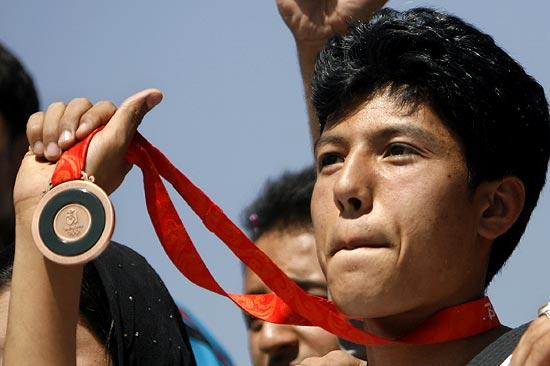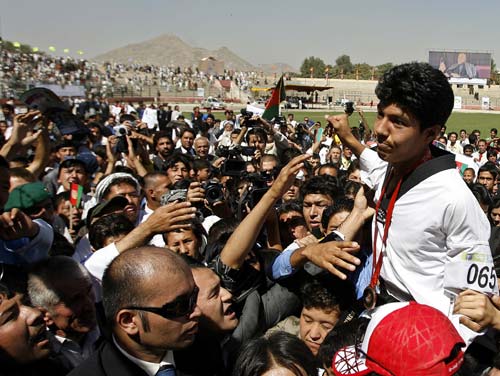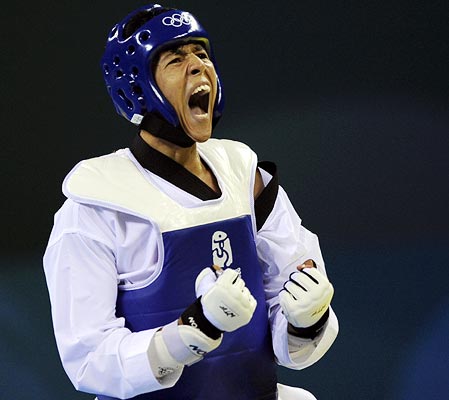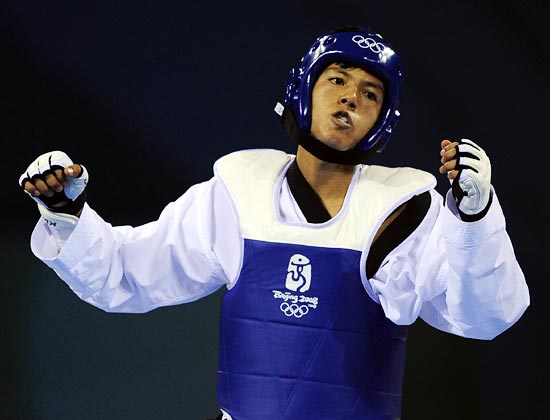Photographs: Reuters
The luxury apartment in north Kabul where Rohullah Nikpai lives with his family was a gift from the Afghan president, made after the 24-year-old Taekwondo champion brought home his country's first ever Olympic medal in 2008.
As he prepares for his next qualification opportunity in Thailand this week, his hopes for the London Olympic games next year are even higher.
- Power Your Champions -- contribute just Rs 100
"In the last Olympics, I got a bronze medal," he says, serving tea and snacks in his beautifully decorated lounge from a gold and silver tray. "This time, I want to win a gold medal for my country."
'We need a lot more equipment'
Image: Rohullah Nikpai is carried by the crowd during a procession for his homecoming in Kabul from the Beijing 2008 Olympic GamesPhotographs: Reuters
Nikpai received a hero's welcome when he returned to his native Kabul, a city scarred by three decades of conflict, from Beijing after beating Spanish world champion Juan Antonio Ramos in the 58kg category.
He has come a long way since his early days training in an Iranian refugee camp in the 1990s, where he took up taekwondo at the age of 10.
"Before, I didn't have any facilities for my training," he says. "Now it is better, but we need it to be even better. We need a lot more training, a lot more equipment."
'Athletes should have security'
Image: Rohullah NikpaiPhotographs: Reuters
In the immediate aftermath of the Games, he received a raft of gifts: his new home, money, a car.
But not all the support he was promised appeared, and with state funding sporadic at best from a government struggling with a tricky security transition, persistent violence and a flailing economy, Nikpai is having to do without the financial means star athletes in other countries might expect.
Despite his obvious pride in his country, Nikpai has been less than impressed by the support offered to the Afghan taekwondo team. They needed more equipment, he says, and more regular wages.
Team members can receive a monthly government stipend of 500-700 Afghanis (around $10-$14.50), but even this modest payment often fails to materialise.
"We are getting a lot of medals for Afghanistan, the government should look after these people," he says. "We hope to have better facilities before the fight, for all fighters. The government should be preparing for that."
"Athletes should have security," he adds. "When they have security, they can train well, they can fight well, and they can win medals."
'At the Olympics, all of the sportsmen are champions'
Image: Rohullah NikpaiPhotographs: Reuters
Nikpai has been winning medals since the age of 19, when he took gold in his first major competition in India. Two years later, he was an Olympian.
If his most recent training under the guidance of coaches Bashir Taraki and Korea's Min Sin-hak takes him through qualification, he will be fighting for Olympic gold in east London's ExCel centre next August.
While the sport, whose name translates from Korean as "the way of foot and fist", is dominated by South Korea and China, Nikpai is loath to be drawn on the fighters he expects to prove toughest to beat.
"At the Olympics, all of the sportsmen are champions," he adds with a smile.
Having been first inspired to enter the sport by his brother Habib, he now trains twice a day with the national team. Competing at the Olympic Games was a longstanding goal for him, even during his early years in local competitions in Kabul.
"When I started out in competitions, I made a lot of mistakes, I got knocked down," he says. "I got a lot of experience from that."
"In 2006, when I got gold medal at the south Asia games, I felt like I was ready to fight in an Olympic match."
Given that it took him only two years to claim a bronze medal in Beijing, the additional four may be long enough to lift him two more places on the podium.






Comment
article